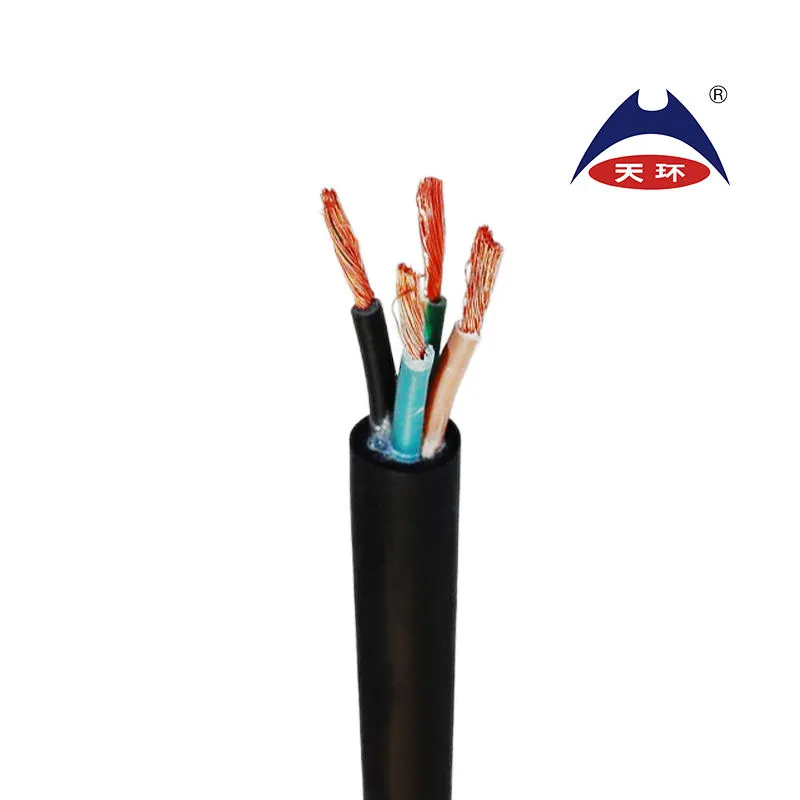
Rubber Cable: A Flexible Defender in the Field of Power Transmission
In the vast field of power transmission, Rubber Cable, with its unique material and excellent performance, has become an important "guardian" to ensure stable power transmission. With its flexible body, it adapts to diverse and complex environments, playing an irreplaceable role in various electrical scenarios and laying a solid foundation for the safe and efficient operation of the power system.

The core advantage of Rubber Cable lies in its unique material and structural design
The internal conductors of cable rubber are mostly made of high-purity copper or aluminum, which have excellent conductivity and can effectively reduce power transmission losses, ensuring stable power output. The external insulation layer and sheath are made of specially formulated rubber material, which is not only flexible in texture, easy to bend and install, but also has excellent physical and chemical properties. The use of natural rubber or synthetic rubber endows cables with good insulation, wear resistance, and corrosion resistance, enabling them to maintain stable working conditions in various complex environments.
The performance of Rubber Cable is outstanding and has significant advantages in practical applications
The strong flexibility of rubberised cable enables them to adapt to special needs such as narrow spaces and frequent movements, and are widely used in situations that require frequent bending and dragging, such as power connections for port cranes, mining machinery, and other equipment. At the same time, Rubber Cable has good weather resistance and can maintain stable electrical performance in both high and hot temperatures, as well as extreme cold and low temperatures; The characteristics of oil resistance, acid and alkali resistance enable it to operate normally even in industrial oil pollution and chemical corrosion environments, greatly expanding its application range. In addition, high-quality rubber cables also have safety properties such as flame retardancy and tear resistance, providing reliable security for power transmission.
From industrial production to daily life, the application scenarios of Rubber Cable are extremely diverse
In the industrial field, silicone insulated wire are the "lifeline" for power transmission of various mechanical equipment, ensuring the stable operation of production lines; In construction, its flexibility facilitates wiring and can meet the power requirements of complex building structures; In outdoor projects such as wind farms and temporary lighting facilities, Rubber Cable ensures stable power supply with excellent weather resistance and protective performance. In home settings, rubber cables are also commonly used for mobile appliances, outdoor courtyard lighting, etc., with their safe and reliable performance, they provide protection for daily electricity consumption.
With the advancement of technology, Rubber Cable is also constantly iterating and upgrading
The research and development of new rubber materials, such as innovative applications of silicone rubber and ethylene propylene rubber, have further improved the high temperature resistance and aging resistance of cables; The integration of nanotechnology has made the insulation layer of rubber cables denser and significantly enhanced their electrical performance. The development of intelligent technology has enabled some rubber cables to have built-in monitoring chips that can provide real-time feedback on parameters such as cable temperature and current, enabling fault warning and facilitating timely maintenance. At the same time, environmentally friendly rubber cables have also become a development trend, using halogen-free and low smoke materials to reduce environmental pollution and conform to the concept of sustainable development.
In summary, rubber cables have become an important component in the field of power transmission due to their flexibility, excellent performance, and wide applicability. It not only ensures stable power supply and meets diverse electricity demands, but also constantly breaks through technological innovation. In the future, with the development of the energy sector and continuous technological innovation, Rubber Cable will undoubtedly play a greater role in power transmission and other fields with more advanced technology and reliable quality, providing solid power security for social development.
Rubber Cable FAQs
What are the main features of a rubber cable?
Rubber Cable has good flexibility, wear resistance and anti-aging performance, and is suitable for occasions with frequent movement or bending. The insulation layer is made of rubber material, which can maintain stable performance in high temperature, humid or oily environments.
What are the typical applications for rubber cables?
Commonly used in industrial equipment, construction sites, mining machinery, port lifting equipment and other scenarios that require frequent movement or harsh environments, it is also suitable for temporary power supply and outdoor operations.
What is the difference between rubber cable and PVC cable?
Rubber cables are softer, more resistant to bending, and have better high temperature and oil resistance than PVC cables; PVC cables have lower costs and are suitable for fixed installation, but they are prone to hardening and becoming brittle in low temperature environments.
What is the rated voltage range of a rubber cable?
The common rated voltage range of rubber cables is 300/500V to 0.6/1kV, and some special models can support higher voltages, depending on actual needs.
How to properly maintain a rubber cable?
Avoid prolonged exposure to sunlight or corrosive substances, and store in a coiled manner after use to reduce damage; Regularly inspect the surface for cracks or aging, and promptly replace damaged parts to ensure safety.
-
0.6/1 kV Low Voltage XLPE Insulated Multi-Core SWA Armoured Cable-Tianhuan Cable Group|Durable Industrial Cables&Fire-Resistant Design소식Sep.29,2025
-
0.6/1 kV XLPE Insulated Multi-Core SWA Armoured Cable - Tianhuan Cable Group | High-Durability&Fire-Safe Design소식Sep.29,2025
-
0.6/1 kV XLPE SWA Cable-Tianhuan Cable|Low Voltage Power Cable&Industrial Cable소식Sep.29,2025
-
0.6/1 kV XLPE SWA Armoured Cable-Tianhuan Cable|Low Voltage, Durable, Fire Resistant소식Sep.29,2025
-
XLPE Insulated SWA Armoured Cable-Tianhuan Cable Group|High Electrical Insulation&Mechanical Protection소식Sep.29,2025
-
0.6/1 kV Low Voltage XLPE Insulated Multi-Core SWA Armoured Cable - Tianhuan Cable Group | Power Transmission, Durability, Safety소식Sep.29,2025
-
0.6/1 kV XLPE Insulated SWA Armoured Cable - Tianhuan Cable Group | High Voltage Resistance&Durable Construction소식Sep.29,2025














